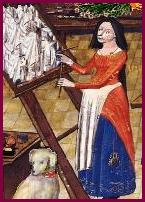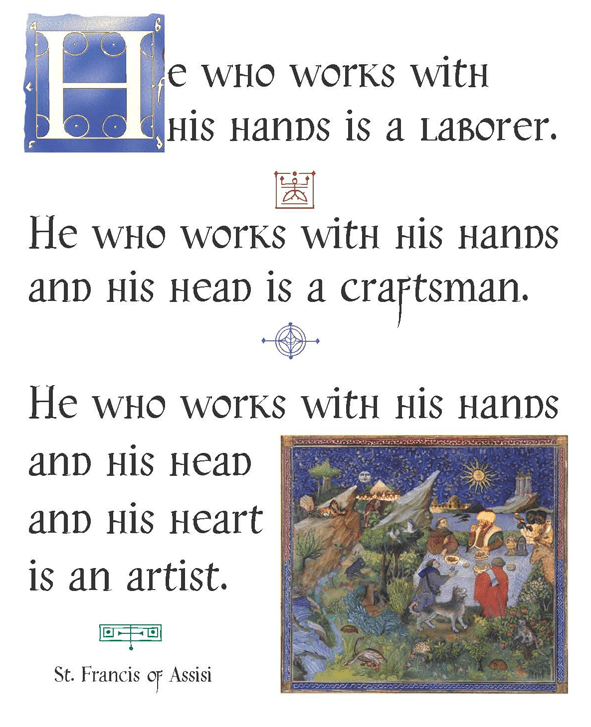
St. Francis of Assisi
Patron of Animals, Birds, Environmentalists,
Italy, Italian Merchants • Promoter of Peace, Simplicity & Harmony
The life of this beloved saint is well-documented by scholars and artists, but versions do vary. The information below was taken from my “illuminated manuscript” about St. Francis. I’ve highlighted links to click for more information. ‑pb
By most accounts, Francis was born in Assisi, Umbria, Italy, in 1181. He was christened John (Giovanni) Bernadone, but his father, Pietro (a wealthy cloth merchant) later named him Francesco (The Frenchman). His mother, Pica, is thought to have been Provençal.
The eldest son of several siblings, Francis grew up in privilege. He had little interest in serious pursuits, preferring to indulge in courtly pleasures.
Handsome, gallant and good-natured, at about age 20, he joined some adventurous comrades to engage in combat with neighboring Perugia. Unfortunately, Francis was captured, and during his imprisonment contracted an illness which lingered long after his release, apparently causing him to regret his irresponsible lifestyle.
His good health returned, however, and so did his longing for chivalrous glory. Donning knightly finery, he joined Walter de Brienne to fight in southern Italy. There he encountered a formerly powerful military officer who was begging in the streets. Francis was so moved that he gave him his own fine clothing.
Soon after, he again fell ill and began having visions and mystical experiences, inspiring him to return home and commit himself to caring for the poor and suffering; offering peace and comfort in place of strife.
But his new attitude did not appear to be appreciated by his friends and family. Denounced as a coward, he made a pilgrimage to Rome, where he shocked onlookers by kissing a leper. His increasingly “odd” behavior even caused him to be stoned in the streets.
Undaunted, he went to pray one day in a ruined church near Assisi, where he heard a voice say: “Francis, go and repair my house which you see is falling down.” Taking the words literally, he immediately set out to repair the chapel with family funds, much to the chagrin of his father.
Eventually, his extreme acts of charity drove his father to disinherit him. The bishop of Assisi advised Francis to return all his father’s goods and to trust in God. He did so on the spot, including shedding every stitch he was wearing.
The bishop promptly mustered up some clothes; Francis thanked everyone and walked away singing. For the next few years, he devoted his life to humble acts of charity and his clothing eventually evolved to a simple, rough brown tunic. His love extended to everyone, from “Brother Sun” to “Sister Moon”–he gave sermons to birds, tamed a fierce wolf , and would not even blow out a candle lest he hurt the flame.
, and would not even blow out a candle lest he hurt the flame.
His innate good nature and charm obviously remained, because, despite appearing a mad fool to many, he began attracting a large following. In 1210 the Pope authorized the forming of the “Friars Minor” (commonly called Franciscans). They were to have no money or property. Their task was to proclaim the love of God more through deeds than words. (In 1212, a wealthy young woman named Clare sought him out, which eventually led to her founding the order of the Poor Clares.)
More doer than administrator, in 1219 Francis traveled to North Africa in an attempt to stop the crusades and bring peace between Muslims and Christians. He actually managed to speak to the Sultan, Melek-al-Kamil, and convinced him to agree to an armistice.
The Sultan, though, made the point that Muslims believed as firmly in the truths of Islam as Francis did in the truths of his own faith. Much to Francis’ disappointment, the Christian leaders refused to agree to the truce. However, the Franciscans were given permanent custody of the Christian shrines then in Muslim hands.
Francis returned to Italy, once again ill, and died a few years later, on 4 October 1226. A complexly simple man, he left an enormous legacy of love for all of God’s creation that transcends time and religious differences.


